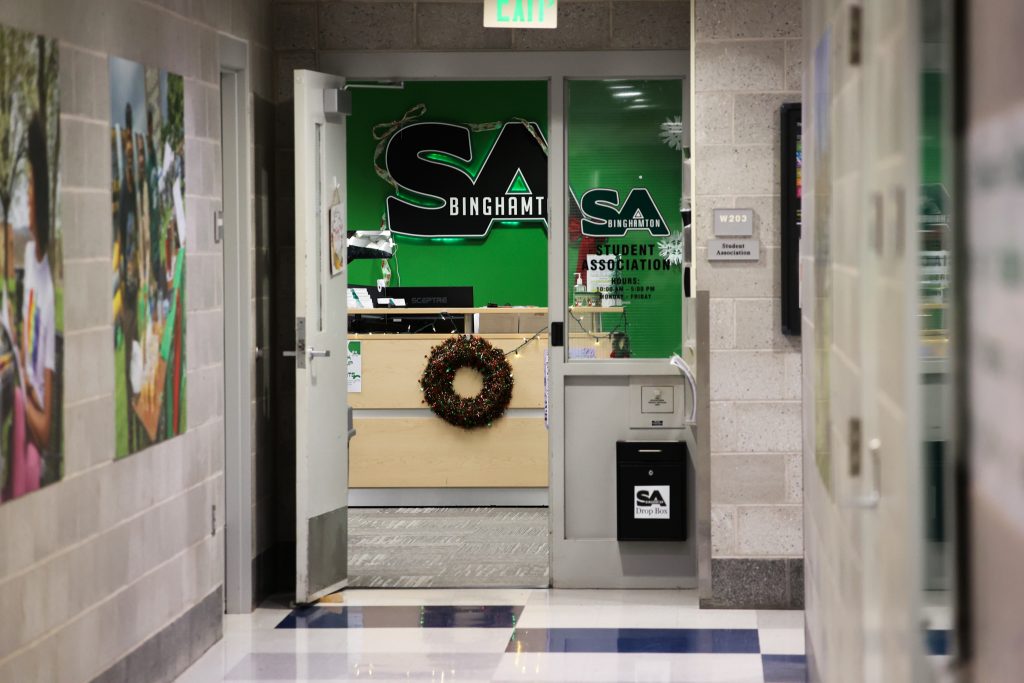After a lengthy debate at this Tuesday’s Student Association (SA) Congress meeting, the body voted to approve an updated Elections Code — which governs the elections process for the SA’s Executive Board and the Binghamton University Council representative — and the spring 2024 election timeline.
Most debate was centered around updates to section six of the Elections Code — presented by Ben So, the Elections and Judiciary Committee chair and a senior double-majoring in history and philosophy, politics and law — which lists regulations on candidates and their campaigns. The definition of bribery was expanded to include not just monetary gains, but also influence, social standing or any comparable benefits, goods or services. It also strengthened the committee’s ability to enforce the rules and explicitly barred candidates from using their leadership positions to influence their opponents.
An entirely new passage prohibited endorsements from the SA, including its E-Board and Congress, members of the Elections and Judiciary Committee and justices on the Judicial Board. One initially proposed amendment, met with intense debate, required at least one E-Board member to attend the candidate debate as a prerequisite for their organization endorsing a candidate. Some questioned the logistics behind tracking attendance, as well as the potential effect on legacy relationships between candidates and E-Boards of endorsing organizations.
Following multiple failed votes on the Elections Code — some lacking a majority and one lacking a quorum of voting representatives — an amendment was unanimously passed encouraging candidates to reject endorsements from organizations that did not send at least one E-Board representative to the debate. As a result, the updated code was adopted shifting the responsibility from SA.
Tyler Brechner, a Hinman College representative and an undeclared freshman, expressed his satisfaction with the compromise amendment.
“I am overjoyed that the [SA] Congress voted to accept the amendment by Nick [Ginsberg, a sophomore double-majoring in political science and sociology,] to allow organizations to have the freedom to endorse whomever they choose in SA E-Board elections without restrictions,” Brechner wrote. “[The] amendment was a compromise between the initial Elections Code and my amendment that achieves the goals of my amendment in all but name. The initial Elections Code would have stopped candidates from publicizing the endorsement of student organizations if an organization did not send an E-Board member to the candidate debate. The SA Congress acknowledged the flaws with this controlling approach and chose not to restrict organizations’ endorsement processes, as critiques of endorsements should come from students, not heavy-handed regulations from the SA.”
After, the body’s attention turned to approving the spring election calendar. According to the document, the election period will occur from Dec. 8, when advertising begins, to election day on March 17, when voting will be open between 8 a.m. and 8 p.m. Chance Fiorisi, the SA’s executive vice president (EVP) and a junior majoring in political science, had expressed concern with the election date that was eventually changed.
”My biggest concern [is] that the date of the election was held on a Saturday,” Fiorisi wrote in an email. “Many Jewish students on campus celebrate Shabbat on Saturdays, […] and I had expressed to the chair that this is a potential concern, as we want every student voting in our elections, without any restrictions.”
Notable dates include the letter of intent period from on Feb. 1 to Feb. 15, platforms due on Feb. 23 and the candidate debate on March 12. So explained the process behind finalizing the timeline.
“The process of creating and finalizing the elections timeline typically takes around [four to five] weeks,” So wrote in an email. “In early October, I meet with the Elections and Judiciary Committee to review the previous year’s election calendar and discuss any issues with it. With this information and the SA Management Policies, I draft the elections calendar and meet with the [EVP] to review and finalize it for approval. Once the calendar is created, the approval process takes about [two to three] weeks. First, it is proposed to and reviewed by the Elections and Judiciary Committee for approval. Once approved by the committee, I propose it to the SA for approval.”
After the election, the results will be certified by the SA Congress on March 26, according to the approved calendar.
“Other than the Election Day concern, the calendar is clear and concise,” Fiorisi wrote. “It follows last year’s timeline closely which, in my opinion, was efficient with petition periods and other important dates.”
Disclaimer: Tyler Brechner is a contributing writer for Pipe Dream News.



